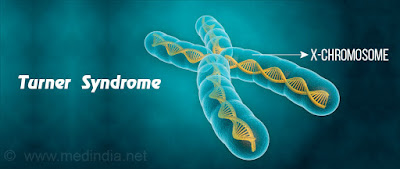CAUSES
Most people are born with two sex chromosomes. Boys inherit the X chromosome from their mothers and the Y chromosome from their fathers. Girls inherit one X chromosome from each parent. In girls who have Turner syndrome, one copy of the X chromosome is missing, partially missing, or altered.
The genetic alterations of Turner syndrome may be one of the following:
- Monosomy: The complete absence of an X chromosome generally occurs because of an error in the father's sperm or in the mother's egg. This results in every cell in the body having only one X chromosome.
- Mosaicism: In some cases, an error occurs in cell division during the early stages of fetal development. This results in some cells in the body having two complete copies of the X chromosome. Other cells have only one copy of the X chromosome.
- X chromosome abnormalities: Abnormal or missing parts of one of the X chromosomes can occur. Cells have one complete and one altered copy. This error can occur in the sperm or egg with all cells having one complete and one altered copy. Or the error can occur in cell division in early fetal development so that only some cells contain the abnormal or missing parts of one of the X chromosomes (mosaicism).
- Y chromosome material: In a small percentage of Turner syndrome cases, some cells have one copy of the X chromosome and other cells have one copy of the X chromosome and some Y chromosome material. These individuals develop biologically as female, but the presence of Y chromosome material increases the risk of developing a type of cancer called gonadoblastoma.
Effect of the chromosomal errors
The missing or altered X chromosome of Turner syndrome causes errors during fetal development and other developmental problems after birth- for example, short stature, ovarian insufficiency, and heart defects. Physical characteristics and health complications that arise from the chromosomal error vary greatly.
RISK FACTORS
The loss or alteration of the X chromosome occurs randomly. Sometimes, it's because of a problem with the sperm or the egg, and other times, the loss or alteration of the X chromosome happens early in fetal development.
Family history doesn't seem to be a risk factor, so it's unlikely that parents of one child with Turner syndrome will have another child with the disorder.



Comments
Post a Comment